
Photo by JESHOOTS.COM on Unsplash
Research shows that gaming, particularly the networked type, has the power to reinforce a sense of friendship and connectedness for teens. About eight-in-ten gamers say they feel more connected to their gaming buddies.
Pew Research reports that teen gamers play with lots of different types of people, from friends they know in person (89%), to friends they know only online (54%), to others who are not friends (52%), etc. Thanks to online multiplayer titles like Battlefield or Call of Duty, more than ever teens have a great opportunity to interact and spend time with friends or to make new acquaintances through verbal communication and collaboration / gameplay.
More than half of teens reported making new friends online, while a third say they met new friends this way. 23% say they wouldn’t have a problem giving a new friend their gaming handle as contact information. Here’s one every gamer will relate to: according to the research, some teens particularly enjoy playing with people they don’t know, because “they relish the competitive aspect of playing with unknown quantities,” reads the report. More numbers below:
- 59% of teens who play online with others use a voice connection when they play
- 16% of boys play games with others in person on a daily or near-daily basis
- 34% play games with others online almost every day
- 35% of boys say they play together with others on a weekly basis (for girls, that number is 15%)
- 78%) say they feel more connected to existing friends they play games with
According to the researchers, :”Playing games can have the effect of reinforcing a sense of friendship and connectedness for teens who play online with friends […] The depth of teens’ sense of connectedness to friends when playing online with others is evenly divided for both genders, with about 38% of teens saying ‘yes, a lot’ in response to the connectedness question and another 40% replying ‘yes, a little.’”
But while networked play can foster new relationships, it is still a long way from being the go-to-place for human interaction. Because of online bullying, many still put down their controllers and switch off, according to the study.
Post A Reply